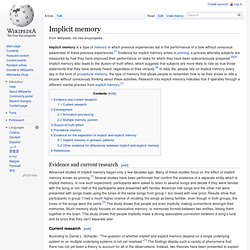

- StumbleUpon. What Are You Saying Between the Lines? ► Fox On The Run by Sweet. 15 Things You Should Give Up To Be Happy. Health/Lifestyle. 10 More Common Faults in Human Thought. Humans This list is a follow up to Top 10 Common Faults in Human Thought.

Thanks for everyone’s comments and feedback; you have inspired this second list! It is amazing that with all these biases, people are able to actually have a rational thought every now and then. There is no end to the mistakes we make when we process information, so here are 10 more common errors to be aware of. The confirmation bias is the tendency to look for or interpret information in a way that confirms beliefs.
Top 10 Thinking Traps Exposed. Our minds set up many traps for us. Unless we’re aware of them, these traps can seriously hinder our ability to think rationally, leading us to bad reasoning and making stupid decisions. Features of our minds that are meant to help us may, eventually, get us into trouble. Here are the first 5 of the most harmful of these traps and how to avoid each one of them. 1. Recency illusion. The recency illusion is the belief or impression that a word or language usage is of recent origin when it is in fact long-established.

The term was invented by Arnold Zwicky, a linguist at Stanford University who was primarily interested in examples involving words, meanings, phrases, and grammatical constructions.[1] However, use of the term is not restricted to linguistic phenomena: Zwicky has defined it simply as, "the belief that things you have noticed only recently are in fact recent".[2] Linguistic items prone to the Recency Illusion include: "Singular they" - the use of they to reference a singular antecedent, as in someone said they liked the play. According to Zwicky, the illusion is caused by selective attention.[2] References[edit] Jump up ^ Intensive and Quotative ALL: something old, something new, John R.
External links[edit] Is History Really As the History Books Teach Us? The First Civilizations Author: Philip Coppens Is history really as the history books tell us or is civilization — when humankind began to cultivate plants, work metals, build monuments and live in organized settlements — far more complex and older than we assume?

As a ten-year-old child in school, my teacher taught that Greece was the cradle of civilization, even though in 1981 it was clear that this was no longer the case: Egypt and Sumer were known to be far older civilizations, but somehow the text books used in Belgian schools had not caught up with the “facts”. 28 Ways to Stop Complicating Your Life. Fallacy of composition. Dear Customer who stuck up for his little brother, Éloge de la transmission. Your Evolved Intuitions. Part of the sequence: Rationality and Philosophy We have already examined one source of our intuitions: attribute substitution heuristics.

Today we examine a second source of our intuitions: biological evolution. Evolutionary psychology Evolutionary psychology1 has been covered on Less Wrong many times before, but let's review anyway. Lions walk on four legs and hunt for food. Certain evolved psychological mechanisms in humans are part of what makes us like each other and not like lions, skunks, and spiders. These mechanisms evolved to solve specific adaptive problems. Clear Thinking in a Blurry World - Amazon.com. James Randi Educational Foundation. Cognitive Biases. List of cognitive biases. Top 10 Common Faults In Human Thought. Humans The human mind is a wonderful thing.

Cognition, the act or process of thinking, enables us to process vast amounts of information quickly. For example, every time your eyes are open, you brain is constantly being bombarded with stimuli. You may be consciously thinking about one specific thing, but you brain is processing thousands of subconscious ideas. Unfortunately, our cognition is not perfect, and there are certain judgment errors that we are prone to making, known in the field of psychology as cognitive biases.
The Gambler’s fallacy is the tendency to think that future probabilities are altered by past events, when in reality, they are not. 5 Logical Fallacies That Make You Wrong More Than You Think. The Internet has introduced a golden age of ill-informed arguments.

You can't post a video of an adorable kitten without a raging debate about pet issues spawning in the comment section. Forer effect. A related and more general phenomenon is that of subjective validation.[1] Subjective validation occurs when two unrelated or even random events are perceived to be related because a belief, expectation, or hypothesis demands a relationship.

Thus people seek a correspondence between their perception of their personality and the contents of a horoscope. Forer's demonstration[edit] On average, the students rated its accuracy as 4.26 on a scale of 0 (very poor) to 5 (excellent). Only after the ratings were turned in was it revealed that each student had received an identical sketch assembled by Forer from a newsstand astrology book.[2] The sketch contains statements that are vague and general enough to most people.
In another study examining the Forer effect, students took the MMPI personality assessment and researchers evaluated their responses. The Forer effect is also known as the "Barnum effect". Repeating the study[edit] Variables influencing the effect[edit] Recent research[edit] The Science of Why We Don't Believe Science. Illustration: Jonathon Rosen "A MAN WITH A CONVICTION is a hard man to change.

Tell him you disagree and he turns away. Show him facts or figures and he questions your sources. Appeal to logic and he fails to see your point. " So wrote the celebrated Stanford University psychologist Leon Festinger (PDF), in a passage that might have been referring to climate change denial—the persistent rejection, on the part of so many Americans today, of what we know about global warming and its human causes. Festinger and several of his colleagues had infiltrated the Seekers, a small Chicago-area cult whose members thought they were communicating with aliens—including one, "Sananda," who they believed was the astral incarnation of Jesus Christ.
Through her, the aliens had given the precise date of an Earth-rending cataclysm: December 21, 1954. Festinger and his team were with the cult when the prophecy failed. You Are Not So Smart. Implicit memory. Evidence and current research[edit] Advanced studies of implicit memory began only a few decades ago.

Many of these studies focus on the effect of implicit memory known as priming.[1] Several studies have been performed that confirm the existence of a separate entity which is implicit memory. In one such experiment, participants were asked to listen to several songs and decide if they were familiar with the song or not. Half of the participants were presented with familiar American folk songs and the other half were presented with songs made using the tunes of the same songs from group 1 but mixed with new lyrics. Results show that participants in group 1 had a much higher chance of recalling the songs as being familiar, even though in both groups, the tunes of the songs were the same.[5] This study shows that people are even implicitly making connections amongst their memories. Current research[edit] According to Daniel L. 15 Styles of Distorted Thinking. 25 Acts of Body Language to Avoid.
Our body language exhibits far more information about how we feel than it is possible to articulate verbally.

All of the physical gestures we make are subconsciously interpreted by others. This can work for or against us depending on the kind of body language we use. Some gestures project a very positive message, while others do nothing but set a negative tone. Most people are totally oblivious to their own body language, so the discipline of controlling these gestures can be quite challenging. Most of them are reflexive in nature, automatically matching up to what our minds are thinking at any given moment. Nevertheless, with the right information and a little practice, we can train ourselves to overcome most of our negative body language habits. Practice avoiding these 25 negative gestures: “ I speak two languages, Body and English. ” — Mae West. Video. The Brain.
Athene's Theory of Everything.